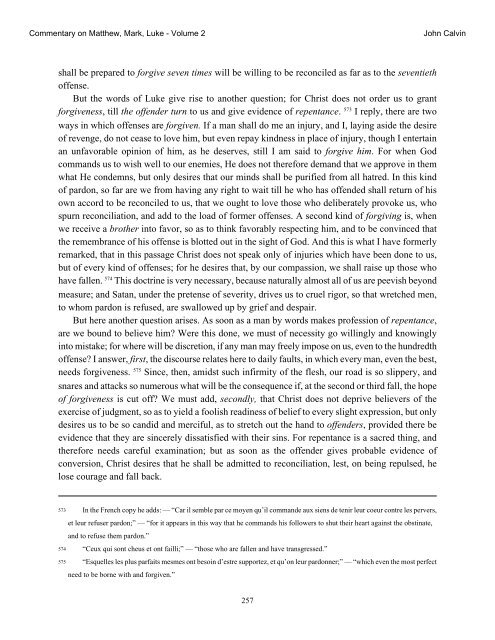Commentary on Matthew, Mark, Luke - Volume 2.pdf
Commentary on Matthew, Mark, Luke - Volume 2.pdf
Commentary on Matthew, Mark, Luke - Volume 2.pdf
Create successful ePaper yourself
Turn your PDF publications into a flip-book with our unique Google optimized e-Paper software.
<str<strong>on</strong>g>Commentary</str<strong>on</strong>g> <strong>on</strong> <strong>Matthew</strong>, <strong>Mark</strong>, <strong>Luke</strong> - <strong>Volume</strong> 2<br />
shall be prepared to forgive seven times will be willing to be rec<strong>on</strong>ciled as far as to the seventieth<br />
offense.<br />
But the words of <strong>Luke</strong> give rise to another questi<strong>on</strong>; for Christ does not order us to grant<br />
forgiveness, till the offender turn to us and give evidence of repentance. 573 I reply, there are two<br />
ways in which offenses are forgiven. If a man shall do me an injury, and I, laying aside the desire<br />
of revenge, do not cease to love him, but even repay kindness in place of injury, though I entertain<br />
an unfavorable opini<strong>on</strong> of him, as he deserves, still I am said to forgive him. For when God<br />
commands us to wish well to our enemies, He does not therefore demand that we approve in them<br />
what He c<strong>on</strong>demns, but <strong>on</strong>ly desires that our minds shall be purified from all hatred. In this kind<br />
of pard<strong>on</strong>, so far are we from having any right to wait till he who has offended shall return of his<br />
own accord to be rec<strong>on</strong>ciled to us, that we ought to love those who deliberately provoke us, who<br />
spurn rec<strong>on</strong>ciliati<strong>on</strong>, and add to the load of former offenses. A sec<strong>on</strong>d kind of forgiving is, when<br />
we receive a brother into favor, so as to think favorably respecting him, and to be c<strong>on</strong>vinced that<br />
the remembrance of his offense is blotted out in the sight of God. And this is what I have formerly<br />
remarked, that in this passage Christ does not speak <strong>on</strong>ly of injuries which have been d<strong>on</strong>e to us,<br />
but of every kind of offenses; for he desires that, by our compassi<strong>on</strong>, we shall raise up those who<br />
have fallen. 574 This doctrine is very necessary, because naturally almost all of us are peevish bey<strong>on</strong>d<br />
measure; and Satan, under the pretense of severity, drives us to cruel rigor, so that wretched men,<br />
to whom pard<strong>on</strong> is refused, are swallowed up by grief and despair.<br />
But here another questi<strong>on</strong> arises. As so<strong>on</strong> as a man by words makes professi<strong>on</strong> of repentance,<br />
are we bound to believe him? Were this d<strong>on</strong>e, we must of necessity go willingly and knowingly<br />
into mistake; for where will be discreti<strong>on</strong>, if any man may freely impose <strong>on</strong> us, even to the hundredth<br />
offense? I answer, first, the discourse relates here to daily faults, in which every man, even the best,<br />
needs forgiveness. 575 Since, then, amidst such infirmity of the flesh, our road is so slippery, and<br />
snares and attacks so numerous what will be the c<strong>on</strong>sequence if, at the sec<strong>on</strong>d or third fall, the hope<br />
of forgiveness is cut off? We must add, sec<strong>on</strong>dly, that Christ does not deprive believers of the<br />
exercise of judgment, so as to yield a foolish readiness of belief to every slight expressi<strong>on</strong>, but <strong>on</strong>ly<br />
desires us to be so candid and merciful, as to stretch out the hand to offenders, provided there be<br />
evidence that they are sincerely dissatisfied with their sins. For repentance is a sacred thing, and<br />
therefore needs careful examinati<strong>on</strong>; but as so<strong>on</strong> as the offender gives probable evidence of<br />
c<strong>on</strong>versi<strong>on</strong>, Christ desires that he shall be admitted to rec<strong>on</strong>ciliati<strong>on</strong>, lest, <strong>on</strong> being repulsed, he<br />
lose courage and fall back.<br />
573 In the French copy he adds: — “Car il semble par ce moyen qu’il commande aux siens de tenir leur coeur c<strong>on</strong>tre les pervers,<br />
et leur refuser pard<strong>on</strong>;” — “for it appears in this way that he commands his followers to shut their heart against the obstinate,<br />
and to refuse them pard<strong>on</strong>.”<br />
574 “Ceux qui s<strong>on</strong>t cheus et <strong>on</strong>t failli;” — “those who are fallen and have transgressed.”<br />
575 “Esquelles les plus parfaits mesmes <strong>on</strong>t besoin d’estre supportez, et qu’<strong>on</strong> leur pard<strong>on</strong>ner;” — “which even the most perfect<br />
need to be borne with and forgiven.”<br />
257<br />
John Calvin

















